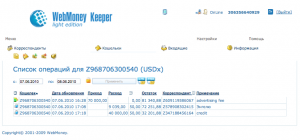Pavel Vrublevsky, the embattled co-founder of ChronoPay — Russia’s largest online payments processor — has reportedly fled the country after the arrest of a suspect who confessed that he was hired by Vrublevsky to launch a debilitating cyber attack against a top ChronoPay competitor.
KrebsOnSecurity has featured many stories on Vrublevsky’s role as co-founder of the infamous rogue online pharmacy Rx-Promotion, and on his efforts to situate ChronoPay as a major processor for purveyors of “scareware,” software that uses misleading computer virus infection alerts to frighten users into paying for worthless security software. But these activities have largely gone overlooked by Russian law enforcement officials, possibly because the consequences have not impacted Russian citizens.In the summer of 2010, rumors began flying in the Russian blogosphere that Vrublevsky had hired a hacker to launch a distributed denial of service (DDoS) attack against Assist, the company that was processing payments for Aeroflot, Russia’s largest airline. Aeroflot had opened its contract for processing payments to competitive bidding, and ChronoPay was competing against Assist and several other processors. The attack on Assist occurred just weeks before Aeroflot was to decide which company would win the contract; it so greatly affected Assist’s operations that the company was unable to process payments for extended periods of time. Citing the downtime in processing as a factor in its decision, Aeroflot ultimately awarded the contract to neither ChronoPay nor Assist, but instead to Alfa-Bank, the largest private bank in Russia.
According to documents leaked to several Russian security blogs, investigators with the Russian Federal Security Service (FSB) this month arrested a St. Petersburg man named Igor Artimovich in connection with the attacks. The documents indicate that Artimovich — known in hacker circles by the handle “Engel” — confessed to having used his botnet to attack Assist after receiving instructions and payment from Vrublevsky. The same blogs say Vrublevsky has fled the country. Sources close to the investigation say he is currently in the Maldives. Vrublevsky did not respond to multiple requests for comment.
The allegations against Artimovich and Vrublevsky were supported by evidence collected by Russian computer forensics firm Group-IB, which said it assisted the FSB with the investigation. Group-IB presented detailed information on the malware and control servers used to control more than 10,000 infected PCs, and shared with investigators screen shots of the botnet control panel (pictured at left) allegedly used to coordinate the DDoS attack against Assist. Group-IB said Artimovich’s botnet also was used to attack several rogue pharmacy programs that were competing with Rx-Promotion, including Glavmed and Spamit (these attacks also were observed by security firm SecureWorks in February).
This DDoS saga is the latest chapter in a fascinating drama playing out between the two largest rogue Internet pharmacies: Vrublevsky’s Rx-Promotion and Glavmed (a.k.a. “Spamit”), a huge pharma affiliate program run by Igor Gusev, the man who co-founded ChronoPay with Vrublevsky in 2003.
Gusev has been in exile from his native Moscow since last fall, when Russian authorities named him the world’s biggest spammer and lodged criminal charges against him for operating an illegal business. Spamit was forced to close shortly thereafter, and Gusev blames Vrublevsky for using his political connections to sabotage Spamit. Late last year, Gusev launched redeye-blog.com, a blog dedicated to highlighting alleged wrongdoing by Vrublevsky. In one post, Gusev charged that Artimovich agreed to DDoS Spamit.com because he believed forum members fleeing the program would join his own budding spammer forum: the still-active but largely dormant program Spamplanet.
Both ChronoPay and Glavmed/Spamit suffered hacking attacks last year that exposed internal documents, financial dealings and organizational emails. The data leaked from Glavmed/Spamit includes a list of contact information, earnings and bank account data for hundreds of spammers and hackers who were paid to promote the program’s online pharmacies. Those records suggest that for most of 2007, Artimovich was earning thousands of dollars a month sending spam to promote Spamit pharmacy sites.
The document that the FSB used to lay out the case for criminal proceedings against Artimovich, a.k.a. “Engel,” states that he was paid for the DDoS services with funds deposited into a WebMoney account “Z578908302415″. According to the leaked Spamit affiliate records, that same WebMoney account belonged to a Spamit affiliate who registered with the program using the email address “support@id-search.org.” Web site registration records for id-search.org show that the name of the registrant is hidden behind paid privacy protection services. But historic WHOIS records maintained by DomainTools.com reveal that for a two-month period in 2008 those registration records were exposed; during that brief window, records listed the registrant as Igor Artimovich from Kingisepp, Russia, a town 68 miles west of St. Petersburg.
 The emails and documents leaked from the hacking intrusion into ChronoPay last year show that Artimovich and Vrublevsky exchanged numerous emails about payment for unspecified services. Among them is an email receipt from WebMoney showing a transfer of more than $9,000 from an account Vrublevsky controlled to Artimovich’s Z578908302415 purse on July 6, 2010, just days before the DDoS attacks began. The notation listed next to the payment receipt? “Engel.”
The emails and documents leaked from the hacking intrusion into ChronoPay last year show that Artimovich and Vrublevsky exchanged numerous emails about payment for unspecified services. Among them is an email receipt from WebMoney showing a transfer of more than $9,000 from an account Vrublevsky controlled to Artimovich’s Z578908302415 purse on July 6, 2010, just days before the DDoS attacks began. The notation listed next to the payment receipt? “Engel.”http://krebsonsecurity.com/2011/06/financial-mogul-linked-to-ddos-attacks/


No comments:
Post a Comment